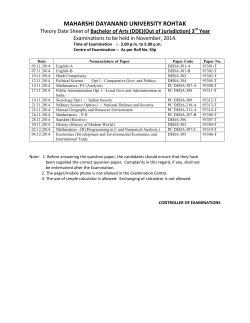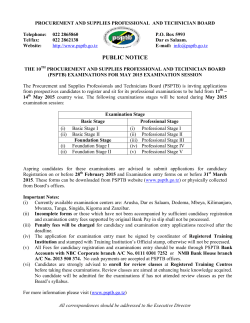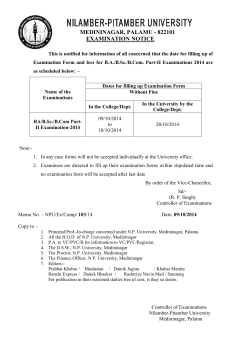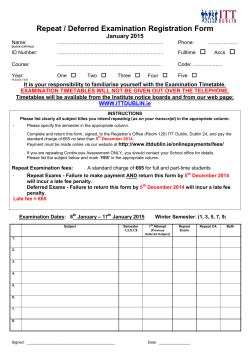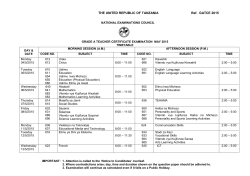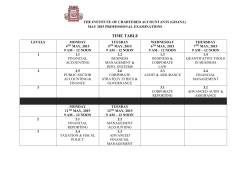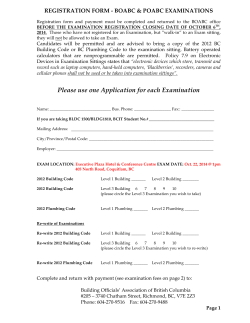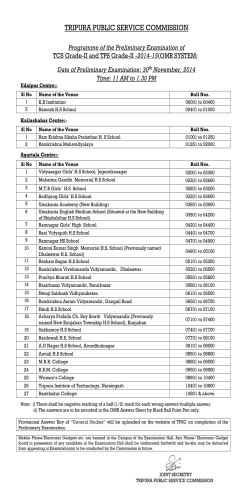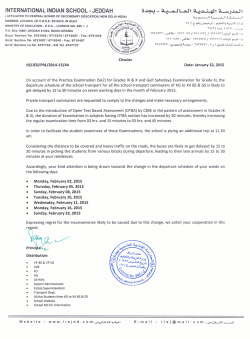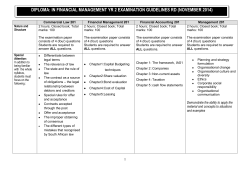
i SCHOOL OF LIBRARY, ARCHIVES AND
SCHOOL OF LIBRARY, ARCHIVES AND DOCUMENTATION STUDIES (SLADS) PROSPECTUS 2014/2015 i ii Table of Content 1.0 BACKGROUND INFORMATION ............................. 1 1.1 Introduction .................................................... 1 1.2 Vision ............................................................. 1 1.3 The Mission of the School ............................... 2 1.4 The School Objectives ...................................... 2 1.5 Education Motto .............................................. 2 1.6 Accreditation Status ........................................ 3 1.7 Location of the School ...................................... 3 1.8 Training Programmes ...................................... 4 1.9 SLADS Administration ..................................... 4 2.0 SLADS SENIOR ADMINISTRATIVE STAFF.............. 4 2.1 Heads of Academic Department ....................... 5 2.2 Heads of Planning Finance & Administration Department ..................................................... 5 3.0 COURSES AND AWARDS ....................................... 5 3.1 Course Objectives ........................................... 5 4.0 ADMISSION PROCEDURES ................................... 6 4.1 General Information ......................................... 6 4.2 Admission Terms ............................................. 6 4.3 Registration ..................................................... 6 4.4 Regulations ..................................................... 7 4.5 General Admission Requirements ..................... 8 5.0 COURSE OFFERED ............................................... 9 5.1 NTA Level 4 ..................................................... 9 5.2. NTA Level 5 ..................................................... 10 5.3. NTA Level 6 ..................................................... 11 6.0 RULES REGARDING ATTENDANCE, COURSE WORK ASSESSMENT EXAMINATIONS .................. 12 6.1 Attendance ...................................................... 12 6.2 Coursework ..................................................... 12 6.3 Courses Assessment ........................................ 13 6.4 End of Semester Examinations ........................ 13 6.5 Practical Work/Fieldwork ................................ 13 iii i 6.6 Research Project .............................................. 13 7.0 GENERAL EXAMINATIONS REGULATIONS ........... 14 7.1 Assessment Procedures ................................... 14 7.2 Students Registration for Examinations ........... 14 7.3 Failure to sit for examination ........................... 15 7.4 Student with Disabilities .................................. 15 7.5 Research report Submission ............................ 16 7.6 Dates of Examinations .................................... 16 7.7 Coordination of the School Examinations ......... 16 7.8 Examination Irregularities ............................... 17 7.9 Examination Instructions for Candidates ........ 18 7.10 Invigilation of End of Semester Examinations ... 19 7.11 Release of End of Semester Examination Results ............................................................ 22 7.12 Appeals ............................................................ 22 7.13 Preservation of Examination Scripts ................. 23 7.14 Progress from Semester to Semester ................ 23 8.0 EXAMINATION GRADING SYSTEMS AND CONDITIONS OF AWARD ...................................... 25 8.1 Examination grading for NTA level 4 and 5 ...... 25 8.2 Examination grading for NTA 6 ...................... 26 9.0 CERTIFICATES AND TRANSCRIPTS ..................... 27 10.0 STUDENTS WELFARE, RULES AND REGULATIONS .................................................... 29 10.1 Dean of Students ............................................. 29 10.2 Orientation for New Students ........................... 29 10.3 Students Government ...................................... 29 11.0 FINANCIAL MATTERS .......................................... 30 12.0 ACCOMMODATION............................................... 30 12.1 Security .......................................................... 30 12.2 Cooking .......................................................... 30 12.3 Electricity ........................................................ 30 12.4 Musical appliances .......................................... 31 iv ii 13.0 14.0 15.0 16.0 17.0 18.0 19.0 20.0 21.0 22.0 23.0 24.0 25.0 26.0 27.0 28.0 DEMONSTRATION AND STRIKE ........................ 31 SMOKING AND DRUGS ...................................... 32 FURNITURE ....................................................... 32 FUNCTIONS ....................................................... 32 DRESS ............................................................... 32 GENDER VIOLENCE AND SEXUAL HARASSMENT 32 PREGNANCIES AND MATERNITY ........................ 32 TRAVELLING AND TRAVELLING EXPENSES ....... 33 RELIGIOUS ACTIVITIES ..................................... 33 GAMES AND SPORTS ......................................... 33 CATERING SERVICES ........................................ 33 HEALTH SERVICES ............................................ 34 THE SCHOOL LIBRARY ...................................... 34 INFORMATION COMMUNICATION TECHNOLOGY 35 VEHICLES .......................................................... 36 INTERNAL ORGANS ........................................... 36 28.1 The School Governing Council .................... 36 28.2 The ARC Sub Committee of the Council ....... 36 28.3 The PFA Sub Committee of the Council ........ 37 28.4 Academic Committee ................................... 37 28.5 Admissions Committee ................................ 38 28.6 Examiners Committee ................................. 38 28.7 Appeals Investigation Committee ................. 39 28.8 Library and Information Committee ............. 39 28.9 Research and Consultancy Committee ......... 40 28.10 Students’ welfare and Disciplinary Committee ................................................... 40 28.11 Cooperate Planning, Monitoring and Evaluation Committee ................................. 40 28.12 Integrity Committee ..................................... 41 28.13 Quality Management Committee .................. 41 29.0 COURSE FEES ................................................... 42 29.1 Fees ............................................................ 42 29.2 Mode of payment ......................................... 42 29.3 Fee Structure* For the Academic Year 2014/2015 .................................................. 42 iii v vi 1.0 BACKGROUND INFORMATION 1.1 Introduction The School of Library Archives and Documentation Studies (SLADS) was founded in 1989. It was established under the Ministry of Education and Culture and is run by the Tanzania Library Services Board (TLSB). Before the establishment of the school, TLSB was running Basic ! Headquarters in Dar es Salaam. This course was merged with SLADS in 1990. SLADS is Located at Ukuni 72 km from Dar es Salaam and 4 km from Bagamoyo town. The School is full registered with the National Accreditation Council for Technical Education (NACTE). The Principal of SLADS Mr. Zuberi Hatibu addressing Graduands at 19th Graduation ceremony Nov. 2013 1.2 Vision The School’s vision is: To be a competence-based training Institution for 1 librarians, records managers, archives administrators and information specialists in worldwide. 1.3 The Mission of the School: To improve Library and Information Science Education through Training and Research 1.4 The School Objectives: a. To offer training courses in Librarianship, Information, Records Management, Archives Administration and Documentation Studies at NTA level 4 and NTA level 5 & 6. b. Provide continuing education for Librarians, Records Managers, Archives Administrators and Information Specialists in Tanzania c. Promote and conduct research in librarianship, information management, records management and archives administration. d. Publish learning materials in librarianship, information management, records and archives administration. e. Offer consultancy services in planning, establishment and development of libraries, records management centers, archives administration and information centers. 1.5 Education Motto "#$ 2 Hon. Prime Minister Mizengo Kayanza Pinda addressing the 19th Ceremony at SLADS, Ukuni-Bagamoyo Nov. 2013 1.6 Accreditation Status The School is a legal and viable institution which was awarded Full Registration and Full Accreditation at NTA ! % ' !+ ; ! < ; ! = (Diploma level) with the National Council for Technical Education (NACTE) on 28th June 2004 and 3rd August, 2012 respectively. 1.7 Location of the School 1.7.1 Bagamoyo The school is located at Ukuni - (Dunda Ward) in Bagamoyo District, Coast Region, along the Bagamoyo – DSM road and 4 km from Bagamoyo town. From Dar es Salaam City centre it is about 72 km via Bagamoyo road approximately an hour drive. The school has a center in Dar es Salaam at National 3 Central Library buildings along Bibi Titi Mohamed Road at Kisutu area which offers the same courses that are offered at Bagamoyo campus. 1.8 Training Programmes SLADS conducts training in three levels: Basic Technician ';!%+#> ';! 5) and Ordinary Diploma (NTA level 6) in Library, Archives and Documentation Studies. Besides the above mentioned training programmes SLADS runs a three month Elementary library training $ >? in Library Studies. Besides the above mentioned training programmes, the school runs tailor-made courses related to Library and Information Studies. 1.9 SLADS Administration SLADS is one of the departments in Tanzania Library Services Board. The School Governing Council is the highest decision making organ in the administrative structure. The Director General of TLSB is the Chairperson of the school Governing Council. 2.0 SLADS SENIOR ADMINISTRATIVE STAFF The School senior administrative staff are as follows: Mr. Zuberi Hatibu - Principal Ms. V. Kessy - Deputy Principal (ARC) Mr. Baralle Shiengo - Deputy Principal (PFA) Ms. F. Thembo - Dean of Students 4 2.1 Heads of Academic Department @X@?>[ \ ] 2. Ms. C. Mallya - General Studies 3. Ms. F. Thembo - Library Services 4. Mr. R. Sonyo - Library & Information Studies 5. Mr. P. Lyimo - Records & Archives 2.2 1. 2. 3. 4. Heads of Planning Finance & Administration Department Mr. S.O. Suleiman Mr. E. Munuo Ms. B. Mwakatobe Mr. L. Ngowo - Finance Internal Auditor Administration Planning 3.0 COURSES AND AWARDS The following courses are offered in the School: a) National Technical Award Level 6 (NTA level 6) b) National Technical Award Level 5 (NTA level 5) c) National Technical Award Level 4 (NTA level 4) d) Elementary Library Training 3.1 Course Objectives The main objectives of the above mentioned programs are: a) To inculcate among learners appropriate generic competencies required for following up the subject matter of Library Science, Records and archives administration; and b) To inculcate a sound foundation in Information and Communication Technology 5 4.0 ADMISSION PROCEDURES 4.1 General Information All enquiries about admission to the School should be addressed to: The Principal School of Library, Archives and Documentation Studies P.O. Box 227 Bagamoyo Tanzania Telephone: +255 23 244 044; +255 23 244 0101 Fax: +255 23 244 0333 E-mail: [email protected] Website: www.slads.ac.tz 4.2 Admission Terms a) A candidate will be admitted to SLADS on understanding that he/she has accepted and commits himself/herself to adherence to regulations, rules and by-laws set by the school. SLADS is an Institution which expects its students to behave ethically on and off campus. The school reserves the right to withdraw admission for misconduct that is contrary to the objectives of the school. b) The school normally invites application for admission to its programmes between the early February to end of May for courses beginning in August. c) A nonrefundable/transferable application fees of Tsh. 20,000/= for all programmes has to be paid through NMB Bank Account Number 2103500010. 6 4.3 Registration a) It is an offence to submit false information when applying for admission. Applicants who will be found >! other false information will not be considered and appropriate legal action will be taken against him/ her. b) All new students are required to report for orientation > ?|> c) Successful applicants will be registered only after they have paid the school fees d) Fees once paid will not be refunded e) All students, if accepted, are expected to abide by all the School regulations. f) Students discontinued from studies because of examination irregularities will be considered for readmission after have been away for two years. They will be required to re-apply and compete with other applicants for admission into the relevant study programs 4.4 Regulations Governing Studies Postponement and Change of Names a) No student shall be allowed to postpone studies after effective commencement of an academic year except under special circumstances and with permission from the Principal. b) Permission to postpone studies shall be considered after producing satisfactory evidence of the reasons for postponement. Special circumstances shall include ill sickness and serious social problem and severe sponsorship problem. c) No change of names by the students will be entertained during the course of study. Names appeared on the ? 7 4.5 General Admission Requirements 4.5.1 NTA level 6 Ordinary (Diploma) + }"! ; ! '<+ ?> passes for all subjects of this level. + ! ~ }'~}}+ with One Principal pass. + }"! ;!'%+?> $ ~ } (“O” level) CSEE. Note: Principal level passes in Bible knowledge / Islamic studies is not counted 1.1.3 + ~ } '] !+ ?> FOUR (4) passes in any subject. OR + ~ } '] !+ ?> the minimum of TWO (2) passes and possession of an Elementary Library Training course Note: Principal level passes in Bible/Islamic studies is not Counted 1.1.4 !"#!$ ~ } ']\!+ ?> minimum of 2 passes. 8 5.0 COURSE OFFERED 5.1 NTA Level 4 Semester 1 Code Scheme of Study hrs/wk Credit L T P AS (Module) Module Title Communication and Customer Care Skills Organisation of Library LST 04101 Materials GST 04101 Basic Computer applications Introduction to record RAT 04101 keeping and archives Management TOTAL GST 04102 2 1 1 3 11 3 2 5 4 20 2 1 5 2 15 2 1 3 2 13 59 Semester 2 Scheme of Study hrs/wk Code LST 04202 Module Title L T P AS Credit (Module) Library Routines and Services 2 1 5 3 17 2 - 3 1 8 1 - 1 1 6 4 2 10 4 20 LST 04203 Library record keeping RAT 04202 Preservation of Records Safety and Security LST 04204 of Library and Information Materials GST 04201 Field Practice/ Attachment 10 TOTAL 61 9 5.2. NTA Level 5 Semester 1 Code LST 05105 LST 05106 LST 05107 RAT 05103 LST 05108 GST 05109 GST 05110 TOTAL Scheme of Study hrs/wk Credit L T P AS (Module) Module Title materials. Bibliography Bibliographic Control Cataloguing of library and information materials. Library statistics and reports Lending of Library and Archives Information materials. Entrepreneurship Research Methodology 2 1 2 1 10 2 - 1 2 10 2 1 3 3 11 2 3 4 3 07 2 1 3 1 8 1 - - 1 05 10 67 Semester 2 Code Module Title LST 05210 User information needs. Information searching and LST 05211 retrieval GST 05203 Communication Skills. GST 05204 Management principles Health Information on GST 05210 HIV/ AIDS and other diseases Environmental GST 05211 Management Studies GST05208 Field Practical TOTAL 10 Scheme of Study hrs/wk Credit L T P AS (Module) 2 1 2 3 10 2 2 5 5 9 2 1 2 3 10 2 - 2 1 07 1 - - 1 05 2 1 1 1 08 10 63 5.3. NTA Level 6 Semester 1 Scheme of Study hrs/wk Module Title L T P AS Credit (Module) LST 06112 Library and Information Management Systems 2 1 3 2 10 GST 06106 Database and Data Security 2 2 1 8 2 2 10 2 1 8 Code GST 06107 Digital Library 2 1 RAT 06104 Records and Archival Management 2 LST 06113 Collection Development 3 3 1 3 13 LST 06114 Information Literacy 2 1 2 2 10 TOTAL 59 Semester 2 Scheme of Study hrs/wk L T P AS Credit (Module) Reference and LST 06215 Information Services 2 1 2 2 10 Community Information GST 06207 needs 3 3 1 3 8 GST 06208 Administration and Management 3 3 1 3 12 LST 06216 Marketing of Library and Information Services 2 1 1 2 8 LST 06217 Knowledge Management 2 1 0 2 8 Code Module Title GST 06110 Research Report 15 TOTAL 11 61 of the School Governing Council, Dr. Alli Minister TAMISEMI Mr.Majaliwa(MP) ,School ! "!# $ %&' % * +/th Ukuni-Bagamoyo 6.0 RULES REGARDING ATTENDANCE, COURSE WORK ASSESSMENT AND EXAMINATIONS 6.1 Attendance $ # ? |# attachment and other programs. Students are expected to avail themselves for at least 75% of the course for each program enrolled for in order to be allowed to sit for examinations; for this purpose, an attendance register shall be maintained for all lectures. 6.2 a) b) c) d) Coursework Every student shall be required to do all exercises ?>>> ? | Any student who deliberately, or through negligence, does not do any or part of such exercises will not have complied with coursework requirements. Such a student shall not be eligible to sit for the examination in the respective subject. Any student who misses a test without prior permission will not be allowed to do an alternative test. Any absence from class due to sickness shall be supported by a note from a recognized medical Practitioner. 12 f) Plagiarism is forbidden in the School, using another person’s words or ideas as if they are ones own without acknowledgement is an academic crime and treated by this school as a serious offence. 6.3 Courses Assessment In accordance with the examination regulations of the School, students in all courses will be assessed in the following areas:a) Seminar contributions b) Class tests c) Practical work d) Research Project e) End of Semester examinations 6.4 End of Semester Examinations At the end of each semester, each student has to answer $ "'?>>}"+ related to different modules taught in the respective semester. 6.5 Practical Work/Fieldwork NTA level 4 and NTA level 5 students shall be required to undertake practical work at the end of second semester. The practical work is designed to impart skills on the $ $ >>> shall prepare and present a plan document related to | ! > $ ' will be given by the practical work coordinator). 6.6 Research Project There will be a research project for NTA level 6 students. Students will be required to produce Comprehensive Research papers on any aspect of library, information, archives and documentation depending upon areas of 13 subject specialization. The papers should have at least Forty (40) double spaced typed A4 pages but not more >'<+$ 6.6.1 Distribution of Marks for Research Project and Practical Work Field attachment for NTA LEVEL 4 & 5 100% Research Report for NTA LEVEL 6 100% Pass Mark for all subjects examined is 50%. 7.0 GENERAL EXAMINATIONS REGULATIONS 7.1 Assessment Procedures a) Each Module shall be assessed on continuous assessment and end of semester exams. Continuous assessment shall constitute 50% and end of exams 50% of the overall course module performance. b) All continuous assessment results shall be released to the candidates a week before the start of semester examination. c) A letter grade shall be awarded at the end of module after combining of continuous assessment and end of semester exams results. d) After the combining marks for continuous assessment and end of semester examining the aggregated shall be 100%. e) End of semester exam answer scripts shall not be returned to the candidate 7.2 Students Registration for Examinations Students will be registered by the school and admitted into examinations if he/she has completed the prescribed continuous assessment 80% of class attendance and other 14 eligibility conditions as prescribed in the school guide line on the conduct of examinations. All cases of improper attendance shall be referred to Academic Committee to the Principal of the school with recommendations. 7.3 Failure to sit for examination Any candidate who fails to sit for an examination without reasonable cause shall be regarded as having failed that examination. The following may be considered valid reasons for recommending the case:a) Prolonged illness b) Loss of parent or guardian or any incident leading to observe from the institution which merits special consideration, and c) Any other reasons of serious nature as the academic committee of the school may be determined. d) Notwithstanding anything contained in these Regulations no candidate who has been expelled or is still undergoing rustication or has been barred from taking an examination offence or for any other reasons shall be admitted to any examination of the school. 7.4 Student with Disabilities Notwithstanding anything contained in any other regulations the school shall have power in the case of a candidate with disabilities: a) To provide services of competent amanuensis free of charge for writing out the answers at the examination. b) To permit the answers to be typewritten by himself if the examinee so desires. 15 c) To lay down any other method for assessing the examinee’s academic ability and declare his/her result, provided that each case the examinee shall produce such evidence to the satisfaction of the school as it may consider necessary in proof the statement that his/her disability is such that he/ she deserves to be considered for the above facilities. 7.5 Research report Submission Research papers are concurrently regarded as an examinations. Any candidate who fails to submit such $$ ?> > $ > ?> $ > ]# shall be deemed to have failed that program Any candidate who fails an examination as prescribed in 7.3 and 7.5 above shall be discontinued from studies and shall be regarded to have failed the whole course. 7.6 i. ii. iii. 7.7 i. ii. Dates of Examinations Dates for continuous assessments exercise/tests shall be determined by the respective subject/ course Coordinator. Marks for coursework shall be >]??| the commencement of end of semester exams. Dates for the end of semester examinations shall be published in the school almanac. Dates for supplementary examinations shall be published in the school almanac. Coordination of the School Examinations The overall-coordination of examinations shall be > $>] > direction of the Principal. Coursework results for each course shall be completed and made available to students by the respective course coordinator and a copy (in print 16 iii. 7.8 i. ii. iii. and soft copy) to the principal and the Academic ] ?> ?| end of semester examinations. The Academic Committee, on behalf of the Governing Council shall appoint External Examiners for the various subjects. Examination Irregularities All cases of suspected or proved examination irregularities shall be referred to Academic Committee. For the purposes of these regulations, examination irregularities shall mean:a) Cheating (ie. Copying from manuscript and books or any source which is not allowed in the examination room) b) Conversing with a fellow candidates during examinations c) Bringing into the examination room unauthorized materials physically or hidden in briefcases, clothes, pockets, handbags and anywhere else within the examination room. d) Copying from a fellow student e) Any other forms either being kind of dishonesty, ! possession of unlawful materials during the exam. For the purpose of these regulations, unauthorized materials include any written or printed material > $ $ > being brought into the examination room (e.g. cellular or mobile phones, radios, radio cassette, pagers, microcomputers, books exercise books > $> School from time to time. 17 iv. v. vi. vii. 7.9 i. ii. iii. Any candidates found cheating in any part of the examination shall be deemed to have failed in the whole examination for that semester and shall be discontinued from studies with immediate effect, [ >! Any candidate found guilty of bringing unauthorized materials into the examination room in any part of the examination, shall be deemed to have committed an examination irregularity and shall be [ by the Governing Council. Any candidate found guilty of committing an examination irregularity may appeal to the Governing Council in accordance with the provisions of these regulations. The Governing Council may impose penalty on candidate found guilty of committing an examination irregularity, depending on the gravity of the facts or circumstances constituting the offence, as the Governing Council may deem appropriate. Examination Instructions for Candidates Candidates shall be allowed to enter the examination $ > prescribed for the commencement of examinations. No candidate shall be allowed to enter the examination room after half an hour of the commencement of an examination and no candidate shall be permitted to leave the examination room until half an hour has elapsed after the start of the examination. No direct communication (verbal or otherwise) between candidates is allowed during examinations. If any candidate needs to communicate, he/she must do so by raising his/her hand to attract attention of the invigilator for permission. 18 vi. Smoking and drinking alcohol and or being under >>> prohibited. vii. Candidates, subject to the permission of the invigilator, are allowed to go out of the examination room, one at a time, with an escort for not more than ten minutes and only for the purpose of a call of nature. viii. Candidates should use their examination/ registration number only for the end of semester examinations. As such names, initials or any other mark that may distinguish a candidate from another should never be written on script papers or answer books. xi. Each candidate is required to begin each question on a fresh page and to write his/her number on each page. Using anybody else’s number is considered a case of dishonesty and is liable for disciplinary action as shall be determined by examinations committee. Such dishonesty may lead to discontinuation. xii. Candidate must stop writing immediately the invigilator gives notice candidates will be warned at least 15 minutes to time. xiii. Candidates should arrange and fasten their answer papers in order of pages. Before going out of the examination room, each candidate shall personally hand over his/her answer script/booklet to the invigilator and immediately after that shall sign the attendance list for that examination. 7.10 Invigilation of End of Semester Examinations 7.10.1 Before the examinations i. Invigilators should be physically present in the examination room at least twenty minutes before the commencement of the examination. 19 ii. iii. iv. v. vi. > ] ? $ ! ! ?> the following items:x Sealed envelope containing the examination papers to be attempted by candidates. The sealed envelopes containing examination papers must be collected personally by each invigilator > before the examinations start timetable. x Attendance sheet register with candidates, examination numbers for their signature. Invigilators shall search/check students to ensure that they do not enter the examination room with unauthorized materials. Invigilators must ensure that only one answer book is provided for each candidate. The answer book >$$ are provided. Invigilators shall admit candidates to the the commencement. Handbags, purses, overcoats, books, papers and other similar articles shall not be allowed into the examination room. Mobile phones MUST be switched off. Ten minutes before the commencement of the examination the invigilator should:x Make an announcement to the effect that candidates should satisfy themselves that they are in possession of the correct paper. x Call attention to anything that seems to require x Tell candidates when they may begin writing. ? ?! to read the paper and raise questions/concerns or observations. 20 vii. Invigilators should not admit candidates to the examination room after thirty minutes from the commencement of the examination and should not permit them to leave the room until thirty minutes have elapsed. viii. The invigilator shall be responsible for the proper conduct of the examination. It will be his/her duty to report immediately all cases of irregularity or misconduct (on the incidence report form) in the > ] > have to write a report to the principal providing full details of the contravention. 7.10.2 During the Examination i. At the commencement of the examination, invigilators should remind candidates to ensure that they are attempting the right examination papers. ii. Invigilators should ensure that candidates are provided with the necessary examination requirements. (e.g. Scripts, mathematical tables, graph paper) iii. Invigilators should not stay in one place for too long. They should move around and strategically observe candidates from the back. iv. Random checks of answer, books should be done to search for unauthorized materials which may be hidden within the answer books. v. ! >>!>$? unauthorized materials e.g book. Manuscripts, or other aid brought into the examination room) and shall expel from the examination room, any candidate who contravenes these regulations. 21 7.10.3 At the end of the Examination i. No candidate shall leave the examination room during the last thirty minutes of the time allocated for the examination except in cases of emergency. ii. Invigilators shall instruct the candidates to stop writing and ask them to hand over the scripts. iii. Invigilators must ensure that candidates sign against their examination numbers in the attendance sheet $ ! > ] > >>>] iv. Invigilators shall hand over all extra examination $$ >] 7.11 Release of End of Semester Examination Results i. Provisional examination results in every semester > > ] Academic Committee meeting on Examination Results. ii. Declaration of all Examination Results shall take place after the Governing Council has approved the Examination Results. 7.12 Appeals i. Where a candidate is aggrieved by the decision |# ?>> |>> examination, computation of marks, grades or any other academic matter, he/she may submit his/ her appeal to the Academic Committee in writing. ii. $$]?> 14 days from the date of the release of provisional examination results iii. All appeals must be accompanied by a nonrefundable fee of Tshs. 100,000/= (A hundred thousand Tanzania shillings only) per subject. 22 iv. The same rate or any other rates approved by the Governing Council shall be changed for any further appeals or application for review of appeal decisions. 7.13 Preservation of Examination Scripts i. The school shall keep students examination scripts in custody for two years before they can be disposed of. 7.14 Progress from Semester to Semester i. A candidate shall be allowed to proceed to the semester as a continuing student after passing all the examinations for the preceding semester. ii. A student who fails in his/her supplementary examination (s) will be allowed to repeat a year in the failed subject (s) on the condition that:a) He/she will be required to pay half of the tuition fee applicable in the particular year when he/ she repeats the subject. b) He/she attend classes so that he/she is able to do course work along with other students. c) He/she does the examination in the respective semester. d) If the student fails again in this exam he/she will not be allowed to repeat. iii. Supplementary examinations will be twice a year after each semester exams result. Any student who >"?>>> sit for a supplementary examination in any subject in which he/she has failed. The highest grade to be awarded in supplementary examination shall be C. iv. Continuous assessments in general cannot be supplemented and will not be carried over to supplementary. 23 v. vi. vii. Continuing student who fail in the supplementary examination will be allowed to repeat a year in the failed subjects(s). This condition shall not apply to NTA level 4 and NTA Level 6 students. These shall be considered to have failed the whole course. $ > sitting, for a student who, for satisfactory reasons, ? ? > ] $$ the examination(s). A candidate, who either fails or does not appear in special examination(s) without any genuine reason(s) shall repeat a year. Normally, special examinations will be given at the time of supplementary examinations. For the purpose of these regulations, “special exam means an examination taken following one’s failure to sit for a normal examination for reasons of which permission for absence was granted by the Academic ] $4 5% $6*$'78 #% 24 " %: " 5; & < %$8:=!== %% and School tutors at the 19th >?@F+J 8.0 EXAMINATION GRADING SYSTEMS AND CONDITIONS OF AWARD 8.1 Examination grading for NTA level 4 and 5 The following shall be the grading systems for NTA level 4 and 5: Grade A B C D F I Q Score Range (in %) 80 – 100 65 – 79 50 – 64 40 – 49 0 – 39 Excellent Good Satisfactory Poor Fail Incomplete The continuous assessment shall constitute 50% and 50% of the end of semester Examination of the overall performance. The Pass mark for each module shall be 50%. 25 For each credit module the following grades and grade points will hold. Grade A B C D F Excellent Very good Satisfactory Poor Failure Grade points 4.0 3.0 2.0 1.0 0.0 The award at the NTA level 4 and 5 will be granted to a candidate who: a) Passes all credit modules at grades A, B, or C and b) Obtains the overall cumulative Grade Point Average (G.P.A) as follows:Class of Award First class Second class Pass Cumulative GPA 3.5 to 4.0 3.0 to 3.4 2.0 to 2.9 8.2 Examination grading for NTA 6 The following shall be the grading systems for NTA 6: Examination award shall be Grade A B+ B C D F I Q Score Range (in %) 75 – 100 65 – 74 55 – 64 45 – 54 35 – 44 0 – 34 0 26 Excellent Very good Good Satisfactory Poor Fail Incomplete The continuous assessment shall constitute 50% and 50% of the end of semester Examination of the overall performance. The Pass mark for each module shall be 50%. For each credit module the following grades and grade points will hold. Grade A B+ B C D F Excellent Very good Good Satisfactory Poor Grade points 5.0 4.0 3.0 2.0 1.0 Failure 0.0 The awards for the NTA level 6 will be granted to a candidates who: a) Passes all credit modules at grades A,B+, B or C and obtains the overall cumulative Grade Point Average (G.P.A) as follows:Class of Award First class Upper Second class Lower second class Pass 9.0 - Cumulative GPA 4.4 to 5.0 3.5 to 4.3 2.7 to 3.4 2.0 to 2.6 CERTIFICATES AND TRANSCRIPTS % '* +- >~>! > other award to such candidates as shall be declared to >! > > >! been recommended to the Governing Council for the # > > ? 27 % "++-; The school may issue another copy in case of loss, or $ > academic transcription on conditions that:a) >$$$ ? ! b) > > | ] cross it. c) > $ > 6 months after reporting the loss to the School. d) The applicant must produce evidence that the loss had been adequately publicly announced in Government newspapers, including a written loss report from the police e) > $ > > <# ' thousand) shillings. This fee is subject to review by the academic Committee form time to time. $5O% +Qth >?@F+J 28 10.0 STUDENTS’ WELFARE, RULES AND REGULATIONS 10.1 Dean of Students The Dean of Students is responsible for general administration of students’ welfare, accommodation, discipline, social services, and cultural, recreational and religious activities. 10.2 Orientation for New Students Orientation is held one week before the commencement > >? this time students will be exposed to existing rules and regulations guiding their life at the School. 10.3 Students’ Government Students have their own organization known as SLADS Students’ Organization (SLADSSO). This organization accepts every student who is registered with the school to become its member and the organization conducts its election every year. Rights and Privileges are granted to all members. The Students’ Organization is responsible for Students’ academic, social and recreational activities at the School. 10.3.1 SLADSSO Objectives ~~~] > representing all students of School of Library, archives and Documentation Studies. The objectives of SLADSSO shall be: a) To protect and promote students’ interests in all aspects of their lives during their stay at the School. b) To establish a proper organizational basis for communication between the School’s administration and students. 29 c) To form, maintain and develop fraternal relations with students of other learning institutions in Tanzania, Africa and the world at large. 11.0 FINANCIAL MATTERS i. Each student must complete payment of the fees at the beginning of every academic year. ii. A student is not allowed to attend any lecture or tutorial session without being registered with the School. iii. Any student attempting to attend classes or access to any other School’s facility without paying fees is subject to suspension. 12.0 ACCOMMODATION Student who gets accommodation in the school’s hostels is responsible for the proper keeping of all properties and any damage or loss must be reported to the Dean of students. 12.1 Security Students shall be responsible for security, the general cleanliness and tidiness of the rooms they occupy. 12.2 Cooking Cooking of any form by students is not allowed inside the hostels unless for places authorized for such purpose. For the avoidance of any doubt, cooking includes frying, roasting, boiling, baking and warming by use of any source of energy and any appliance. Any person found guilty of an offence under this by law shall be liable for eviction from the room. 12.3 Electricity No cooling appliances and no electric devices other than 30 reading lamps, electric iron or computer shall be used in students’ rooms. Any person found guilty of the offence under this section, shall be liable to a severe warning, 2nd >>> >! > room. Electric lights must not be switched on during the daytime or when an occupant is not in the room. 12.4 Musical appliances Musical appliances and instruments, such as record players, radio set, video and other noise making instruments shall not be used between 12:00 midnight and 6:00 a.m. provided that at any other time, music shall not be played beyond room sound for avoidance of causing nuisance and annoyance to other residents of the hall. Any person found guilty of an offence under this law >! ? > and third breach an eviction from the room. SLADS Girls’ Hostel at Ukuni-Bagamoyo 13.0 DEMONSTRATION AND STRIKE Strikes of any form are strictly prohibited and might lead to participant discontinuation from studies. Students can demonstrate only after getting permission from the Principal. 31 14.0 SMOKING AND DRUGS Smoking and usage of drugs such as Marijuana, Cocaine, etc is strictly prohibited within the school campus and outside the campus 15.0 FURNITURE Student shall not interfere with or transfer furniture or | $ >~> ?> $ ? $ > > Dean of Students. Any student wishing to install any additional furnishing in his/her room may do so subject $ |?? $ > of the Dean of Students. 16.0 FUNCTIONS $ # $ $ $ $ ?> the School may be granted by the Principal. 17.0 DRESS Decent dressing should be adhered by all students. Immoral and inappropriate dressing by a student shall subject him/her into disciplinary actions. 18.0 GENDER VIOLENCE AND SEXUAL HARASSMENT Gender violence and sexual harassment is against human rights. Hence, any student who will be involved in such inhuman activities of any sort shall not be tolerated. Strict disciplinary measures shall be taken against the respective students. 19.0 PREGNANCIES AND MATERNITY i. Pregnancy will not be considered an illness unless otherwise reversed by any medical doctor. An on campus female student is not allowed to stay with her child after birth. 32 ii. After birth, female student shall be granted upon request, a maternity rest not exceeding 21 days from the day of giving birth. Should there be any symptoms of maternal complications after that period; the same will be advised to postpone studies. 20.0 TRAVELLING AND TRAVELLING EXPENSES i. Students are responsible for their own traveling arrangements to and from the School. ii. No student shall, except on very exceptional circumstances, obtain leave of absence for more than total of 14 days in an Academic year. iii. Permission to travel for a weekend and during Public holidays outside Bagamoyo should be granted by the Dean of Students. iv. Permission to travel in and outside the country for less or more than a week and involving missing lectures and seminars shall be obtained in writing from the Principal. 21.0 RELIGIOUS ACTIVITIES Students have complete freedom of worship, with essential limits that the enjoyment of this freedom shall not, in any way prevent other SLADS activities and/or members in the community from enjoying their own freedom. Facilities from all major denominations are available within a walking distance from the School. 22.0 GAMES AND SPORTS The School encourages students to participate in different games and sports. The school provides sport facilities that include football, netball, and athletics. 23.0 CATERING SERVICES i. The school offers cafeteria services for all meals to students at subsidized rates through a private caterer. 33 The meals are paid for at the cafeteria counter. ii. Students are not allowed to interrupt the services provider. First breach severe warning, second breach >> $ iii. Students are not allowed to take their meals in classrooms 24.0 HEALTH SERVICES The school provides basic First Aid Kit/ facilities only. All health cares required specialist attention are referred to relevant hospital in Bagamoyo and Dar es Salaam. Parents are required to pay direct to the student medical fees of at least Tsh. 100,000/= per academic year. 25.0 THE SCHOOL LIBRARY The school has a library on its campus. Its main function is to provide library services to support teaching/ learning and research activities in the school. The collection comprises books, periodicals, CD ROMS and newspapers; covering a wide range of information. All users are required to adhere to the library rules and regulations stipulated from time to time. Students are also advised to avail themselves to services offered by nearby libraries such as ADEM Library, TASUBA Library and the District Library in Bagamoyo town. The library operates under the following time table: SERVICE (HRS) Monday – Friday 09.00am – 12.00pm 12.00pm – 1.30pm 1.30 – 6.30pm DAYS Saturday Sunday & Public Holiday SERVICE (HRS) 09.00am – 2.00pm Closed 34 BREAK Closed Closed Closed Closed SLADS Library 26.0 INFORMATION COMMUNICATION TECHNOLOGY The school believes in information and communication Technology (ICT) as an effective tool for organizing, storing, managing and disseminating data, information and knowledge. The new age of science and technology requires libraries and other information units to be equipped with modern ICT expertise, tools, facilities and services. The school has an ICT laboratory that provides computers, printers, scanners, television sets and powerpoint projectors. All computers are connected to the internet. Students are taught how to use this equipment and other relevant database. SLADS Computer lab 35 27.0 VEHICLES Any student wishing to keep and operate any vehicle, i.e motor vehicles, motor cycles, bicycles, etc at the School shall do that at his/her own risk. The School shall not be responsible for any damage or loss of the vehicle, cycles, bicycles, etc. All vehicles shall be parked at the parking area for visitors, which is outside the administration area. 28.0 INTERNAL ORGANS 28.1 The School Governing Council 28.1.2 Duties i) To govern and control the School. ii) To administer both movable and immovable properties of the School iii) To administer the funds and other assets of the School iv) To formulate policies of the School v) To signify the acts of the School by using the common seal. vi) To receive and give grants, gifts, donations or other moneys on behalf of the School. vii) To establish committees as the Governing Board may viii) To establish a search committee. ix) To receive, consider and make determination on reports and recommendations from the committees. x) To set fees of the School. 28.2 The ARC Sub Committee of the Council 28.2.1 Duties i) To develop and coordinate academic matters and vision. 36 ii) To interpret and promote the SLADS key academic matters. iii) To liaise with consultancy management. iv) To formulate and implement academic policy. !+ ! > " students. vi) To coordinate research and consultancy. !+ > and viii) To coordinate the appointment of external examiners. 28.3 The PFA Sub Committee of the Council 28.3.1 Duties i) To coordinate the institutional planning, and budgeting process and to promote institutional analysis and decision support to senior management. ii) To coordinate policies, procedures and practices of Planning and budgeting control. iii) To develop a policy framework for the implementation, review, updating and evaluation of strategic, institutional and academic plans at SLADS. iv) To formulate, review policies and coordinate implementation of matters relating to the management > v) To oversee the implementation of approved $ > and control within the department by providing professional guidance to subordinate staff. vi) To prepare and review the departments’ budgets, $ 28.4 Academic Committee 28.4.1 Duties i) To satisfy itself regarding the content and academic standard of any course of study offered by the School. 37 ii) iii) iv) v) vi) With the consent of the Governing Council to make regulations regarding:x The eligibility of persons for admission to courses #$# > ? as may be determined by the Governing Council; x > $ > # $# or other award as may be determined by the Governing Council. To regulate the conduct of examinations of the School. To decide whether any candidate for a diploma, > ? >~>> > $ $ > regulations made under paragraph (b). To consider recommendations made by the established departments. To make proposal to the School on matters relating to the Academic affairs. 28.5 Admissions Committee 28.5.1 Duties i) To scrutinize the applications for admission and |$ !" ii) To submit proposal of the provisionally selected candidates to the Academic Committee for approval. + ! > " procedures of students’ admission and make recommendations to the Academic Committee. 28.6 Examiners Committee 28.6.1 Duties i) To receive and review examination results ii) To recommend candidates who have successful $ ? > $# other award of the school. 38 iii) To submit examination results to the Academic Committee. iv) To administer the implementation of examination procedures and regulations. v) To make sure that the examination time table is implemented accordingly from setting of examinations to the releasing of examination results. vi) To make sure that examinations are conducted ?> > possession of unauthorized materials, dishonesty or infringement of procedures and regulations. vii) To deal with all problems pertaining the examinations. viii) To submit recommendations to the Principal and > $> who have been involved in examination irregularities. 28.7 Appeals Investigation Committee 28.7.1 Duties i) To investigate and scrutinize on the authenticity of the appeals and recommend to the Examiners’ Committee for consideration. 28.8 Library and Information Committee 28.8.1 Duties i) To regulate the operation of the Library Unit, ensure the proper utilization of its facilities and ideal provision of services. ii) To undertake publication of journals and serials. iii) To encourage members of staff in research activities and write scholarly papers. iv) To stimulate interest in research and promote writing skills among students. v) To review papers for publication following laid down criteria. 39 28.9 Research and Consultancy Committee 28.9.1 Duties i) To monitor and regulate the activities of the Research and Consultancy Department ii) To recommend research and consultancy policies for approval by the Governing Council. iii) To review and approve research proposals and reports. iv) To solicit and manage Research funds v) To appoint research supervisors for research done by non-staff members. vi) To suggest rates for consultancy services. 28.10 Students’ welfare and Disciplinary Committee 28.10.1 Duties i) To enforce institutional rules and regulations (by law) ii) To handle all disciplinary matters as far as the students are concerned iii) To provide counseling, mediations reconciliation among parties iv) To be responsible for reporting and forwarding disciplinary matters to the students Appeals Disciplinary Committee of the Governing Council. 28.11 Cooperate Planning, Monitoring and Evaluation Committee 28.11.1 Duties + ! $ the Corporate Plan of the School. ii) To monitor progress and assess outcomes compared to the original objectives and expectations. iii) To ensure sustainability of the intended Corporate Plan of the School. 40 28.12 Integrity Committee 28.12.1 Duties i) Spearhead and facilitates the process of combating corruption at the School. ii) Is responsible for the production of the Institution Anti-corruption Action Plan. iii) Receives considers and provides redress to all complaints emanating from within and outside the School relating to ethical issues and maladministration. iv) Participates in the training of senior, middle > | > > ethics and integrity and on anti-corruption theories and measures of transparency and integrity in participatory workshops to enlist support and understanding of the issues to be administered by the Integrity Committee. v) Recommends administrative action to the management of the School as a response to complaints ! > > 28.13 Quality Management Committee 28.13.1 Duties i) To ensure that the School has effective academic quality policies and standards. ii) To establish indicators of effective education and training provision against which the School evaluates its achievements. iii) To see if the effective systems are ensuring that the quality policies of the School are applied throughout the organization. 41 29.0 COURSE FEES 29.1 Fees At the beginning of the Academic year all students are expected to pay full school fees before they can be allowed to use school facilities. Payment of fees should be made before or during $ ?> > $ $ may result in the withdrawn of registration. 29.2 Mode of payment All payments for fees directly paid to SLADS should be made by depositing to Account No. 2103500010 NMB Bagamoyo Branch. However the School is not responsible for any type of charges and or Taxes and the fees once paid is not refundable. 29.3 Fee Structure* For the Academic Year 2014/2015 The Students Training costs for NTA level 4, NTA level 5 & 6 Programmes for Academic Year, will be as shown in the schedules given hereunder. A. PAYABLE TO THE SCHOOL (SLADS) 352*5$00( 7<3( 78,7,21 6/$'662 )((76+ )((76+ &$87,21 021(< 76+ 5(*)(( 76+ 1$&7( (;$06)(( 76+ ,'&$5' )((76+ 727$/)(( 76+6 %DVLF7HFKQLFLDQ &HUWLILFDWH 17$ 7HFKQLFLDQ &HUWLILFDWH 17$ 'LSORPD,, 17$ B: ACCOMODATION $118$/)(( 42 C: PAYABLE DIRECT TO STUDENT 0($/6 $//2:$1&( 75$163257 %DVLF7HFKQLFLDQ &HUWLILFDWH 17$ 7HFKQLFLDQ &HUWLILFDWH 17$ 'LSORPD,, 17$ 352*5$00(7<3( %22.6 67$7,21(5< 0(',&$/ 727$/76+6 SLADS GOVERNING COUNCIL MEMBERS S/N 1. 2 3 COUNCIL MEMBERS Dr. A.A Mcharazo (Chairperson) Mr. John Mahali Mr. Edmund Kinwasi 4 Ms Mary W. Watugulu 5 Mr. Oliver P.J Mhaiki 6 Mr. Z. Hatibu (Secretary) 7 Ms. Victoria Kessy 8 Mr. B.M.R. Shiengo ADDRESSES Tanzania Library Service Board P.O. Box 9283 Dar Es Salaam Bagamoyo District Council DAP Ministry of Education and Vocational Training P.O. Box 9121 Dar Es Salaam Institute Of Adult Education St. Joseph College Dar Es Salaam TEL/MOBILE 0754 296 134 0754 495 252 022 241 041 0757 750 028 022 2137072 0756-333318 Principal SLADS 0755 525 397 Deputy Principal (ARC) – SLADS Deputy Principal (PFA) - SLADS 0713479715 43 0715 691 796 9 SLADSSO President 10 Mr. Abdallah Hassan 11 Mr. Charles C. Magaya 12 MS Edda T. Lwoga Students’ representative ESRF Box Dar es Salaam National Archives P.O.Box 2006 Dar es Salaam 0754 263 390 0713 566 565 Muhas-DSM TANZANIA LIBRARY SERVICES 1. Mrs. Lambertha Mahai 2. Mr. John Mkhumbi 3. Mr. Abdullah Saiwaad 4. Dr. Amina Kabudi 5. Mr. Salmin Kaniki 6. Mr. Bernard Makali 7. Mr. Edward Lugakingira 9. Ms. Irene Msagalla 10. Mr. James Kibamba 11. Dr. Alli Mcharazo BOARD MEMBERS Chairperson Member Member Member Member Member Member Member Member Secretary SLADS MANAGEMENT TEAM PRINCIPAL x Mr. Zuberi A Hatibu: M.A. (Information Studies) Dar; B.A (Hons) OUT DSM; Dipl. Lib. (SLADS) Bagamoyo; Cert in Electronic Library & Information Management (Hyderabad India). DEPUTY PRINCIPAL (Academic, Research & Consultancy) x Ms Victoria T. Kessy: M.A (Information studies) Dar; B.A (LIS) Tumaini University Dip in Special Ed.(Patandi); Dip in Edu.(Marangu) 44 DEPUTY PRINCIPAL (Planning, Financial & Administration) x Mr. B.M.R. Shiengo: BEd (Policy Planning & Administration) OUT DSM; Dip. AE, Teaching Grade ' +# ] ';+~@ INTERNAL AUDITOR: x Mr. Eden N. Munuo: ADA (CBE) PGD Acc. (CBE) DSM BURSAR: x Mr. Suleiman O. Suleiman: ADA (IFM) PGD Finance Mgt (IFM) DSM; MSc Accounting Finance (Mzumbe) DEAN OF STUDENTS: x Ms. Faraja Thembo: B.A (Education) DSM; M.B.A (OUT DSM); MSC. ISC (Makerere) ACADEMIC OFFICER: Ms. Bertha Mwaihojo: M.A (Information Studies) UDSM; B.A Hons (Education) UDSM TUTORS x Ms. Balbina P. Kilongola B.A (LIS) Tumaini University; Dip in Ed. (Morogoro) x Ms. Irene Saria: B.A (LIS) Tumaini University; Dip in Lib. (SLADS) Bagamoyo; Cert in Lib. Studies (SLADS) DSM. x Mr. Said M. Mtanda: M.A (Inf.) UDSM, B.A Ed, Ed (UDSM); Dip in Ed. Korogwe Teachers College. x Ms. Consolatha J. Mallya: BSc Inf. Science – (Pretoria): BSc (Hons) Technology Mgt. (Pretoria S.A). x Ms. Sharifa Hayyata: B.A (LIS) Tumaini University; Dip in Lib. (SLADS) Bagamoyo; Adv. Dip Soc. Work 45 x x x x x x x x x x x x (DSM); Cert in Counseling DSM; Cert in Lib. Studies (SLADS) Bagamoyo. Mr. Clavery Kulindwa Kabalo: B.A (LIS) Tumaini University Makumira (Dar); Dip in Lib. (SLADS) Bagamoyo; Foundation Course (OUT Dar), Higher Standard Lib. (Civil Service Exam – Dar); National Lib. Asst Cert. Course – DSM, NABOCE (NSTIMwanza). Mr. Leonard D. Ngowo: B.A (LIS) Tumaini University; Dip in Lib. (SLADS) Bagamoyo; Cert. in Information Technology (Open Source) Finland. Mr. Sonyo Mussa: B.A (LIS) Tumaini University; Dip in Lib. (SLADS) Bagamoyo; Cert. Ed. (Songea Teachers College) Ms. Happiness Bandoma: B.A (LIS) Tumaini University; Dip in Lib. (SLADS) Bagamoyo; Cert. Ed. (Morogoro) Ms. Joyce Mhidze: B.A (LIS) Tumaini University; Dip in Lib. (SLADS) Bagamoyo Ms. Betiseba George Mwakatobe: B.A (LIS) Tumaini University; Ms. Eva Jeremiah Saileni: B.A (LIS) Tumaini University; Cert. IT (Vision College of Technology & Business Studies – London, UK) Mr. Jonas Philemon: BSc. Informatics _ Sokoine University of Agriculture (SUA) Mr. Ponsiani Zakaria Lyimo: B.A (LIS) Tumaini University; Mr. Lusiu Zerah Grayson: B.A (LIS) Tumaini University; Mr. Yohana Ndimangwa: B.A (LIS) Tumaini University; Mr. Charles Ackley: B.A (LIS) Tumaini University 46 PART TIME TUTORS x Mr. Salum Jumanne: Adv. Dip. In Computer Science (IAA) x Mr. Gahele Jaffary Mwalubawa: ADA (IDM-Mzumbe); DBE (Manchester UK.) Teaching Cert. Grade III A (Moshi), Cert. in Political Economic (Kivukoni Dar x Ms. Mary Magaula: B.A (LIS) Tumaini University x Mr. Abdul Kaijage: M.A Inf. Studies(UDSM); B.A Public Adm.( Mzumbe) x Mr. Haruni Madalengo: B.A (LIS) Tumaini University; Dip in Lib. (SLADS) Bagamoyo; Cert in Lib. Studies (SLADS) Dar es Salaam x Hermenegild David Haule; B.A (Hon) _OUT; Dip. Lib.( Makerere); Cert.Lib (Dar College of National Education- Chang’ombe) TECHNICIAN x Mr. Michael Kanshishy: Dip in Lib. (SLADS) Bagamoyo; Cert in Lib. Studies (SLADS) Dar es Salaam. SENIOR LIBRARY ASSISTANTS x Theresia D. Kayumba: Dip in Lib. (SLADS) Bagamoyo; Cert in Lib. Studies (SLADS) Dar es Salaam x Mwantumu H. Mndolwa: Dip in Lib. (SLADS) Bagamoyo; Cert in Lib. Studies (SLADS) Dar es Salaam x Tumaini F. Ndashuka: Dip in Lib. (SLADS) Bagamoyo; Cert in Lib. Studies (SLADS) Dar es Salaam x Erick F. Margeson: Dip in Lib. (SLADS) Bagamoyo; Cert in Lib. Studies (SLADS) Dar es Salaam SUPPORTING STAFF Assistant Accountant: x Mr. Thadei T. Mabada: NABOCE, DSM 47 Personal Secretary: x Ms. Suzan Gama: Dip in Secretarial Studies - TPSC (Mtwara), Cert. Secretarial Studies - TPSC (DSM) x Ms. Stella Kunambi: Dip in Secretarial Studies TPSC (Tabora), Cert. Secretarial Studies - TPSC (Tabora), Cert. in Computer Studies – MVTTC (Morogoro) Typist: x Ms. Hamida Mushi Senior Driver: x Mr. Jumanne Bwila: NIT (DSM) x Mr. Gift T. Msowoya: NIT (DSM) +=- > x Ms. Anna C. Kayombo x Mr. Hamis R. Jeuri Prof. Tony Olden Ms. Ritva Hyttinen VISITING LECTURERS Dr. Alli Mcharazo, PhD Prof. Alice Nkoma-Wamunza, PhD Prof. Paul Manda, PhD Dr. Evans Wema, PhD 48 Mr. Abdallah Hassan, MA Mr. Theophilius Mlaki, MLS Mr. Hassan Nsubuga, MLS Mr. Al-Amin Yusuph, MLS Mr. Peter Mlyansi, MA Mr. Charles Magaya, MA VISITING LECTURERS FROM OVERSEAS Prof. Kingo Mchombu, PhD, University of Namibia, Namibia Prof. Mr. Anthony Olden, PhD, Thames Valley University London, UK Prof. Ms. Paula Uinomen, PhD, University of Uppsala, Sweden Dr. Mr. John V. Richardson, Jr, PhD, University of California, Los Angeles Ms. Marjatta Lahti, M.A.; Finish Library Association Ms. Sinnikka Sipila, M.A.; Finish Library Association 49
© Copyright 2026
